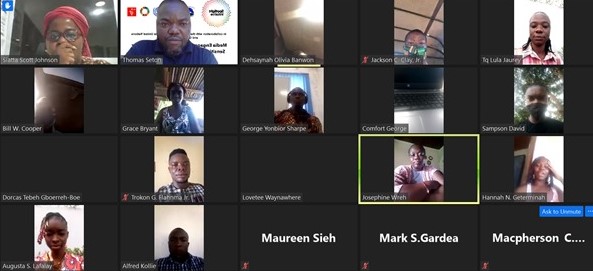Monrovia – Forty-nine media practitioners (27 females and 22 males) from 29 media institutions in Monrovia, Liberia participated in a three day online training session on gender sensitive reporting on COVID-19 and sexual and gender based violence (SGBV) from Tuesday 2 June to Thursday 4 June, 2020.
The Spotlight Initiative supported training was aimed at empowering media practitioners with knowledge and skills to report in a gender sensitive manner and to have more information on how to report on SGBV in order to eliminate violence against women and girls in Liberia.
This training, which was held in Montserrado county, was the first in a series of trainings that will be held in Liberia. It will be followed by trainings in the remaining four Spotlight counties, namely, Lofa, Nimba, Grand Cape Mount and Grand Geddeh. A total of 300 media practitioners including journalists from community media are expected to be trained at the end of the training season in July 2020.
The Montserrado training included participants from print, electronic and online media from various media institutions in Liberia. Before the training, 75 percent of the media practitioners had limited knowledge about gender sensitive reporting on COVID-19 and SGBV.
“Media coverage of gender issues has been lacking in depth, substance and analysis of the core issues affecting women and girls in Liberia, says Ms. Marie Goreth Nizigama, UN Women Country representative for Liberia. “In many instances, sexual and gender-based violence is covered in insensitive ways and with questionable headlines that trivialize the experiences of women and contribute to stereotypes and victim blaming.”
The training was held at a time when cases of SGBV are increasing in Liberia. During crisis such as COVID-19, cases of violence against women and girls normally increase. Reports from the Ministry of Gender, Children and Social Protection indicate that from 16 March to 31 March 2020, 106 cases of gender-based violence were reported and a further 118 cases were reported in April 2020. Out of these, 82 cases were reported in Montserrado County.
“The statistics on the increased prevalence of sexual and gender-based violence in Liberia in the context of the COVID-19 pandemic are very alarming, because the prevalence was already very high, exclaimed Theodorus Kaspers, Head of Cooperation at the EU Delegation in Liberia. “Most of the women and girls no longer have anywhere to hide because most of the violence happens at home; a place which should be a safe space for any individual. It is frightening to imagine, that for many women and girls, homes are not being recognised as a ‘safe space’ but in captivity and violence with their abusers,” he said.
Emphasizing the role of the media to combat SGBV, Honourable Eugene Nagbe, Minister of Information, Culture and Tourism hoped that the training would provide the media with the ammunition and expertise needed to report and flush out incidents of SGBV and help society to find a solution.
“The media is a mirror of society and by reflecting both the positive and the negative, we can be able to see and fix the problems we have,” said Hon. Nagbe. “Violence against women and SGBV is a problem that we have not really been able to tackle effectively despite many efforts by the Government, civil society and partners including UN Women.
Minister Nagbe asserted that COVID-19 has exacerbated cases of SGBV. “We have a global pandemic, a national pandemic and now we have another pandemic of using threats of violence and violence itself. We need to examine ourselves and our society and the media is best place1d to do that,” he said.
Speaking at the same event, the Minister of Gender, Children and Social Protection, Honourable Williamatta Piso Sayde-Tarr commended the European Union and United Nations Spotlight Initiative for adjusting their programs and incorporating the realities that are happening on the ground. She reiterated the importance of the role of media in society. “Journalists can help to change attitudes by portraying women for who they are without reinforcing gender stereotypes.
“We want to be sure that women are involved at all levels of the media and are decision makers and not just reporters. Simply having women in the newsroom is not enough because that does not guarantee being gender responsive or gender sensitive reporting,” she said.
The gender sensitive training was organized and facilitated by the Female Journalists Association of Liberia with support from the European Union, United Nations and Government of Liberia Spotlight Initiative.

